
The Top 5 Korean Sunscreens For Oily Skin To Use In 2024
- Etude House Sunprise Mild Airy Finish Sun Milk SPF 50 (PA+++)
- Missha All Around Safe Block Soft Finish Sun Milk
- COSRX Aloe Soothing Sun Cream SPF50 (PA+++)
- A’Pieu Pure Block Natural Daily Sun Cream
- NEOGEN Dermalogy Day-Light Protection Airy Sunscreen
- How to Choose the Right Sunscreen for Oily Skin
- Common Myths About Sunscreen and Oily Skin
- Application Tips for Oily Skin
- Recommended Routine for Oily Skin
- Embracing Sun Protection as Part of Your Skincare Journey
This post may contain affiliate links, meaning we may receive a small commission at no cost for you, if you purchase through these links.
Finding the perfect sunscreen is a critical step beyond mere sun protection. The challenge for those with oily skin is even more significant, as the wrong product can lead to a greasy appearance, discomfort, and even breakouts. This is where Korean sunscreens come into play, renowned for their innovative formulas that cater to specific skin types with elegance and effectiveness.
Oily skin requires a delicate balance. It needs protection from harmful UV rays without adding extra oil or causing pores to clog, which can exacerbate skin issues. Korean skincare, with its emphasis on gentle, skin-friendly ingredients, offers solutions that protect and enhance skin health.
Embracing the right sunscreen for oily skin is not just about avoiding sunburn; it’s about supporting the skin’s overall health, preventing premature aging, and maintaining a clear, matte complexion even in the toughest of environments.
The products featured on this page stand out because they’ve been rigorously tested to ensure they live up to their promises. They are designed to provide high-level sun protection, control oil production, and leave a matte finish, making them perfect for those who have long searched for a sunscreen that won’t leave their skin feeling greasy or looking shiny.
This table provides a concise overview of each product’s standout features and benefits for those with oily skin, helping to make an informed decision based on specific needs and preferences.
| Name of Product | Main Feature | Why It’s Good for Oily Skin |
|---|---|---|
| Etude House Sunprise Mild Airy Finish Sun Milk SPF 50 | Lightweight, non-greasy, mineral-based | Absorbs excess oil, minimizes appearance of pores, and leaves a matte finish |
| Missha All Around Safe Block Soft Finish Sun Milk | High SPF/PA rating, water and sebum-resistant | Controls oil and shine, durable in heat and humidity, provides a smooth, soft finish without a white cast |
| COSRX Aloe Soothing Sun Cream SPF50 (PA+++) | SPF50/PA+++ protection, contains aloe vera | Offers high-level protection while hydrating without greasiness, aloe vera soothes and calms oily and sensitive skin |
| A’Pieu Pure Block Natural Daily Sun Cream | Lightweight, SPF45/PA+++ | Quick absorption, controls oil production to maintain a fresh, matte finish, no white cast |
| NEOGEN Dermalogy Day-Light Protection Airy Sunscreen | SPF50+/PA++++, lightweight and nourishing | Maximum sun protection with an airy, non-greasy formula that hydrates and controls oil, perfect for maintaining a matte finish without contributing to shine or clogging pores |
Etude House Sunprise Mild Airy Finish Sun Milk SPF 50 (PA+++)
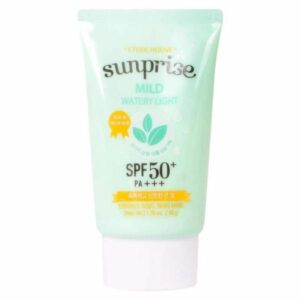
Etude House Sunprise Mild Airy Finish Sun Milk SPF 50 is a lightweight, non-greasy sunscreen that offers superior sun protection while catering specifically to oily skin needs. Its unique formula, enriched with a blend of natural plant extracts, provides a refreshing, airy finish that feels like nothing on the skin. This mineral-based sunscreen uses physical filters to deflect harmful UV rays away from the skin, reducing the risk of sun damage and premature aging. Its mild, non-irritating composition is free from parabens and synthetic dyes, making it suitable for even sensitive skin types. The Surprise Mild Airy Finish Sun Milk is designed to absorb excess oil, minimize the appearance of pores and leave a soft, matte finish that lasts throughout the day. It doubles as a perfect makeup base, ensuring that your skin remains protected without compromising on aesthetics. Including nourishing ingredients helps hydrate and soothe the skin, combating the drying effects often associated with sun exposure.
- Who is this for: Ideal for individuals with oily to combination skin looking for a high-protection, lightweight sunscreen that doesn’t clog pores or exacerbate oiliness.
- Why it’s good: It provides broad-spectrum SPF 50 protection while maintaining a light, matte finish, making it perfect for daily use without the heavy feel typical of sunscreens.
- Main strengths: Its mineral-based formula, matte finish, and oil control properties stand out, alongside being extremely gentle on sensitive skin.
- Price Range: Affordable, accessible for those wanting premium sun protection without a hefty price tag.
Missha All Around Safe Block Soft Finish Sun Milk
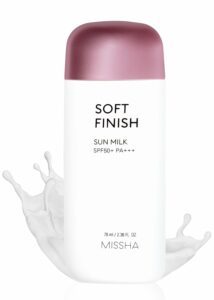
Missha All Around Safe Block Soft Finish Sun Milk is a high-performance sunscreen that marries advanced UV protection with a velvety soft finish, making it a top choice for those with oily skin. This innovative formula offers SPF 50+/PA+++ protection to shield the skin from UVA and UVB rays, thus preventing sunburn, sun damage, and premature aging. Its lightweight texture absorbs rapidly into the skin without leaving any white cast or greasy residue, thanks to its unique water and sebum-resistant technology. This technology also ensures that the sunscreen stays in place, providing long-lasting protection even on the hottest and most humid days. Including natural plant extracts helps to soothe and nourish the skin, while its mattifying effect controls oil production, reducing shine and keeping the skin looking fresh and matte all day. Missha All Around Safe Block Soft Finish Sun Milk is fortified with antioxidants to fight free radicals, adding an extra layer of protection against environmental stressors.
- Who is this for: Perfect for those with oily or combination skin seeking a sunscreen that offers robust protection with a non-greasy, soft matte finish.
- Why it’s good: It provides broad-spectrum protection while controlling oil and shine, enhancing the skin’s natural health without compromising on comfort or wearability.
- Main strengths: High SPF/PA rating, durability in heat and humidity, oil-control properties, and its ability to provide a smooth, soft finish without a white cast.
- Price Range: Mid-range, offering excellent value for its quality and the comprehensive protection it provides.
COSRX Aloe Soothing Sun Cream SPF50 (PA+++)
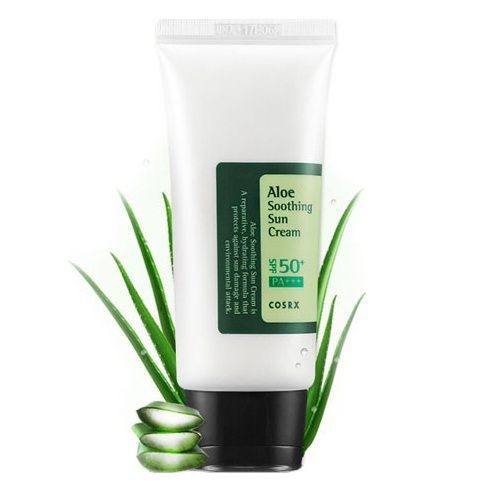
COSRX Aloe Soothing Sun Cream SPF50 (PA+++) is a harmonious blend of sun protection and skin hydration, tailored for those with oily skin who desire UV defense and moisture balance. This sunscreen stands out with its SPF50/PA+++ rating, ensuring a high level of protection against harmful sun rays that can lead to premature aging and skin damage. The star ingredient, aloe vera, is known for its soothing and hydrating properties, offering a burst of moisture without the heaviness or greasiness often associated with sunscreens. Its lightweight formula sinks into the skin effortlessly, providing a comfortable wear throughout the day. Additionally, the aloe vera works to calm any redness or irritation, making it suitable for sensitive skin types as well. The COSRX Aloe Soothing Sun Cream not only shields the skin from the sun but also improves skin health, leaving it feeling soft, hydrated, and refreshed, with a non-shiny finish that oily skin types will appreciate.
- Who is this for: Ideal for individuals with oily, sensitive, or combination skin who need effective sun protection without exacerbating oiliness or causing breakouts.
- Why it’s good: It combines superior sun protection with the skin-soothing benefits of aloe vera, providing hydration without leaving a greasy residue.
- Main strengths: High SPF protection, soothing and hydrating properties of aloe vera, and a lightweight, non-greasy formula.
- Price Range: Affordable, making it an excellent option for daily use by those seeking quality sun protection with added skincare benefits.
A’Pieu Pure Block Natural Daily Sun Cream
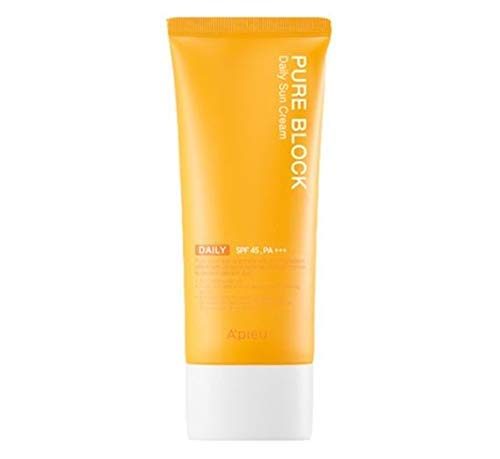
A’Pieu Pure Block Natural Daily Sun Cream is a breath of fresh air for those with oily skin, offering a daily dose of sun protection without the heavy, greasy feel typical of traditional sunscreens. An SPF45/PA+++ provides robust defense against harmful UV rays, minimizing the risk of sunburn, skin damage, and premature aging. This sunscreen is celebrated for its lightweight and fast-absorbing formula, which leaves no white cast, allowing for a seamless incorporation into your daily skincare routine. Enriched with natural extracts, it hydrates and nourishes the skin, while controlling oil production to maintain a fresh, matte finish throughout the day. A’Pieu Pure Block Natural Daily Sun Cream is particularly adept at balancing moisture and protection, making it a go-to for those with oily complexions who struggle to find a sunscreen that doesn’t contribute to excess shine or clog pores.
- Who is this for: Ideal for those with oily skin looking for a sunscreen that offers high UV protection without exacerbating oiliness or leaving a heavy residue.
- Why it’s good: It strikes a perfect balance between sun protection and a lightweight, non-greasy formula, enhanced with natural ingredients for hydration and oil control.
- Main strengths: Effective SPF/PA rating, quick absorption, no white cast, and oil-control properties for a matte finish.
- Price Range: Very affordable, providing excellent value for daily sun protection that caters to the needs of oily skin without breaking the bank.
NEOGEN Dermalogy Day-Light Protection Airy Sunscreen
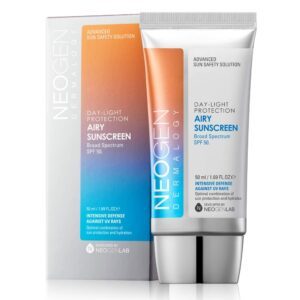
NEOGEN Dermalogy Day-Light Protection Airy Sunscreen is a cutting-edge solution for oily skin types in search of formidable sun protection without the discomfort of a heavy, sticky formula. This sunscreen boasts an SPF50+/PA++++, offering maximum defense against the sun’s damaging rays, which can lead to premature aging and skin damage. Its standout feature is its airy, lightweight texture that feels almost weightless on the skin, absorbing quickly without leaving any white residue or greasiness. Formulated with a blend of natural ingredients, it protects and nourishes the skin, with antioxidants that fight free radicals and hydration that doesn’t clog pores or exacerbate oil production. NEOGEN’s Day-Light Protection Airy Sunscreen is designed to provide an optimal balance of high-level sun protection, skin health, and a matte finish, making it perfect for those with oily skin who need a sunscreen that keeps up with their active lifestyle without contributing to shine or breakouts.
- Who is this for: Perfect for individuals with oily skin seeking a high SPF sunscreen that offers lightweight, non-greasy protection and enhances skin health.
- Why it’s good: It provides superior sun protection with a feather-light formula that hydrates and defends the skin without adding oiliness or shine.
- Main strengths: High SPF/PA rating, ultra-lightweight and quick-absorbing texture, and formulated with skin-benefiting antioxidants and natural ingredients.
- Price Range: Mid to high-range, reflecting its premium ingredients and advanced formulation designed for optimal skin protection and health.
How to Choose the Right Sunscreen for Oily Skin
Selecting the ideal sunscreen for oily skin involves navigating through many products to find one that offers protection without contributing to oiliness. Look for sunscreens labeled as non-comedogenic, meaning they are formulated not to clog pores—a common concern for oily skin types. Physical or mineral sunscreens containing ingredients like zinc oxide or titanium dioxide are often recommended over chemical ones. They sit on top of the skin to reflect UV rays, protecting with a lighter feel. Additionally, seek out formulas with oil-control properties or ingredients such as niacinamide, which can help regulate sebum production, ensuring your skin remains protected and matte throughout the day.
Common Myths About Sunscreen and Oily Skin
Several myths surrounding sunscreen use and oily skin persist, leading to confusion and skincare mishaps. A prevalent myth is that people with oily skin don’t need moisturizer if they use sunscreen. However, sunscreens do not provide the same hydrating benefits as moisturizers and may not adequately address your skin’s hydration needs. Another common misconception is that oily skin doesn’t burn, implying less need for sun protection. This is false; all skin types can burn and suffer damage from UV exposure, making sunscreen an essential part of daily skincare, regardless of skin type.
Application Tips for Oily Skin
Applying sunscreen on oily skin requires a bit of know-how to ensure effectiveness without adding to the skin’s natural shine. Start with a pea-sized amount, applying it evenly over the face. Remember, sunscreen should be reapplied every two hours, or more frequently if you’re sweating or swimming, to maintain optimal protection. Integrating sunscreen with other skincare products or makeup should be done with care; allow the sunscreen to fully absorb before applying makeup to avoid diluting its efficacy. Opt for oil-free or non-comedogenic makeup to complement your sunscreen and maintain a matte finish.
Recommended Routine for Oily Skin
A skincare routine for oily skin should balance oil production while ensuring the skin is clean, hydrated, and protected. Start with a gentle cleanser to remove excess oil and debris. Follow with an oil-free moisturizer to hydrate the skin without adding greasiness. Sunscreen application is the final step for morning routines, ensuring your skin is shielded from harmful UV rays. Consider incorporating salicylic acid products in the evening to help control oil and keep pores clear. Remember, the key to managing oily skin is consistency and selecting products that cater to its needs.
Embracing Sun Protection as Part of Your Skincare Journey
Sun protection is the cornerstone of a holistic skincare routine, pivotal in preserving the health and beauty of your skin. It’s more than just a defensive measure against the sun’s rays; it’s an investment in your skin’s future, safeguarding against premature aging, sun damage, and the risk of skin cancer. Finding the right sunscreen might feel daunting for those with oily skin, but it’s a journey worth embarking on. Each product mentioned offers unique benefits tailored to meet oily skin needs without compromising on protection or comfort.
I encourage you to explore and experiment with the recommended sunscreens to discover the one that aligns with your skin’s needs and lifestyle. The right sunscreen will offer the protection you need and enhance your skin’s overall appearance and health, contributing to a clearer, more radiant complexion.
Embrace sun protection as an essential, non-negotiable part of your daily skincare regimen. Remember, the best sunscreen is the one you enjoy wearing every day. Make sun protection a habit, and your skin will thank you for years.







